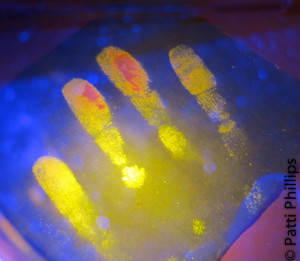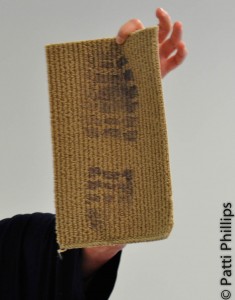If there are no paragraph separations in this article, please double-click on the title to create a more readable version. The CSI shows on TV have generated a tremendous amount of interest in the field of forensics, whether the technicians are in the lab or out in the field at crime scenes. Crime shows (and movies) have changed the way the public looks at law enforcement – not only in how quickly crimes are solved, but how cases are brought to court. As technology has improved, and more efficient ways of assessing evidence have been developed, more careers in the forensic sciences are available than ever before.
The CSI shows on TV have generated a tremendous amount of interest in the field of forensics, whether the technicians are in the lab or out in the field at crime scenes. Crime shows (and movies) have changed the way the public looks at law enforcement – not only in how quickly crimes are solved, but how cases are brought to court. As technology has improved, and more efficient ways of assessing evidence have been developed, more careers in the forensic sciences are available than ever before.
It used to be that cops on the beat, or detectives looking into a potential crime, picked up techniques along the way that pointed them to possible suspects. They learned where evidence (like fingerprints or footprints) might be found by using their experience on the job and continued training after attending the police academy. Not necessarily scientific, but hard work and diligence usually paid off.
These days, crimes can involve the dark web, human trafficking, and international cartels, in addition to the forgeries, kidnappings, and drug busts (etc). Heists are more sophisticated, crime lords sink to greater depths of evil, and crimes against humanity are more widespread and complex. We still need the cops on the beat to help keep our neighborhoods safe, but we also need forensic scientists to help unravel the latest iteration of criminal activity.
Let’s take a look at what kind of training is needed for seven of the various fields. You may know someone who’d like to serve in law enforcement, but who doesn’t want to shoot or chase anyone down an alley in order to catch the bad guys/gals. The following specialties are areas in which they can assist without the need of a bulletproof vest.
Computer Forensics: Identity theft via the internet is on the rise, as is corporate hacking, and cyberterrorism. Highly skilled computer analysts are sought after in almost every area of today’s cyber world. Think ‘Bobby’ in TV’s “Tracker.” Most two and four-year computer forensics programs deliver instruction in investigative techniques, white-collar crime, as well as the laws that oversee the work of searching & seizing digital information, since computer forensic specialists can recover information to be used later in criminal trials.

Cybersecurity: Cybersecurity concentrates on protecting information. Cybersecurity specialists track data thieves, thwart e-terrorists, and guard sensitive electronic information. They generally need at least a bachelor’s degree for entry level jobs, but lots of experience counts.
DNA Analysis: Several colleges and universities have programs to train wannabe DNA analysts, who most often need a bachelor’s degree to start. In order to advance in a career or to work in a more demanding work environment (think the FBI), a master’s or doctoral program might be necessary. What’s interesting to note is that a career in DNA analysis might be reached through a degree in organic chemistry, quantitative analysis, and/or biochemistry, each part of the DNA investigative process.
Forensic Accounting: This career deals with a great deal more than looking into sloppy bookkeeping. Forensic accountants examine flaws in the records of suspected criminals to find financial crimes such as money laundering, insurance fraud, and embezzlement. The Association of Certified Fraud Examiners (ACFE, a certifying agency) reveals that a job at the FBI requires the minimum of a four-year degree, but another year (Master’s level training), is sought after by employers. This field pays very well.
Forensic Anthropologists: People in this career path diagnose posthumous death by analyzing skin tissue, bones, as well as the area where the body was found. The skills needed have helped families find closure in cold cases, and are essential in identifying large numbers of persons who have perished in natural disasters, multiple vehicle crashes, and/or in war zones. Training takes years, however, with the minimum requirement of a Master’s Degree (about 6 years of higher education). Anyone with a wish to get ahead in this field would need a Doctorate as well as Certification in the specialty of choice.
Forensic photographers document a crime scene visually, and the job includes taking images of tire tracks, fingerprints, intentional wounds, and blood spatter patterns. Training as a professional crime scene photographer focuses on understanding crime scene investigation and learning about the types of photos needed to document clues and details. The details in the photos can be essential for solving the crimes and helping to prosecute at trial. Since some photos must be taken at night, without bright lights available to backlight the scene, the photographer must be able to take low light (or no light) shots.
In many jurisdictions, the crime scene isn’t cleared until the photographer and videographer have finished recording all of the evidence. This means that if murder is suspected, a dead body is part of the photography assignment. Training would cover what to do (or not) so that evidence isn’t damaged or destroyed, as well as how to collect, store, and authenticate the crime scene photos. (No photos can be deleted from the memory card, even if blurry.) Training doesn’t always cover the fact that dead bodies smell, a crime scene involving said body is horrific, and that everyone must have a strong stomach to deal with all of the blood and sometimes gore.
Smaller jurisdictions don’t often have enough crimes that need photographic evidence (i.e. a fulltime photographer on staff), so this job may be handed to someone a cop or firefighter knows who can take detailed shots. Not the local wedding photographer, but someone who has the stomach for the gritty stuff. A strong academic background in criminal justice and crime scene investigation techniques might be the best way to move to a career in forensic photography.
Forensic toxicologists use scientific knowledge to decide if accidental or intentional poisoning was a cause of death and to determine fault. A degree in biology or chemistry is generally required at entry level. But some universities offer one-year certificate programs and associate’s and master’s degree programs in forensic toxicology to add to the undergraduate degree. Forensic toxicologists might never see an actual crime scene.
*Some degree requirement information is from forensics colleges.

